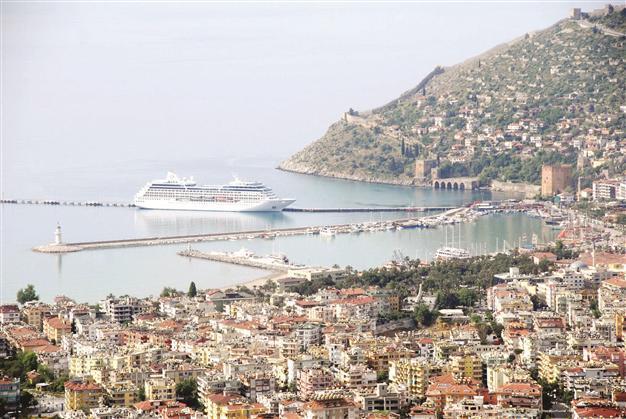Turkey’s real estate sector risks losing foreign buyers
ISTANBUL - Hürriyet Daily News

This aerial photo shows a scene from Alanya, a popular tourism destination in the southern province of Antalya, where many foreigners from various countries are buying land or houses. DHA photo
The increased tax burden and greater complexity of a new real estate tax system may discourage foreign investors, according to actors in the real estate sector.
The new value added tax (VAT) law, which will especially impact small luxury houses located in metropolitan areas, smaller than 150 square meters and licensed by the end of 2013, could intimidate property buyers because of a remarkable price increase, they said.
The sector had been witnessing an increase in foreign real estate acquisitions since the enactment of a bill removing the condition of reciprocity and eased restrictions on the sale of land and real estate to foreign citizens and firms in May of last year. In May alone foreign real estate acquisitions in Turkey reached $1.1 billion, which is four times the total number in 2011.
Nearly 112,300 foreigners have bought 90,000 properties equivalent to 24.1 million square metres area in only top ten Turkish cities, while Antalya is the leading province where 34,078 properties has been sold, according to December 2012 data provided by Environment and Urban Planning inventory.
The new tax will put the Turkish real estate sector in a disadvantageous position against its global
rivals, Ömer Faruk Çelik, chief executive officer of Sinpaş REIT, told the Hürriyet Daily News. “Real estate demand was stuck at around 400,000 sales for several years, and the new tax will pull down the sales even lower.”
In addition to the price surge, foreign real estate investors might refrain from buying real estate properties because of the difficulty of comprehending the puzzling structure of the new system, said Gürler Ünlü, chairman of the Real Estate Strategy Platform (GISP).
Six variablesUnder the new system the tax amounts are determined by the Ministerial Council with regards to six different variables – size in square meters, value of one square meter, luxury house status, license year, the neighborhood and the status of the city (metropolitan or not) – which makes it harder for foreign investors to understand the system.
Sector players are experiencing a short-term rise in property sales since the new regulation applies to houses licensed from 2013 on. The marketability of the houses licensed prior to the regulation is anticipated to rise.
The Association of Real Estate Investment Companies (GYODER) has pulled its 2013 growth forecast for the construction sector down 1 or 2 percent due to the VAT increase, also claiming that five companies may postpone IPO plans because of the possibility of the addition of another tax burden on property developers.
Even if the impact of the regulation is not seen on the sales it will be seen in the new project investments in 2013, Işık Gökkaya, chairman of the board of directors of GYODER, told Reuters.
Firm gets $2.3 bln contract
ANKARA – Anatolian News Agency
Turkish contractors rang in 2013 with a good start, winning nearly $3 billion worth of contracts in Turkmenistan, Kazakhstan and Georgia in the first two weeks of 2013, mainly due to a large Turkmenistan project, Economy Minister Zafer Çağlayan has said.
In his written statement the minister praised the recent contract of Polimeks, which won a $2.253 billion tender for Ashgabat Airport. Up till today, Turkish contractors have undertaken $31 billion worth of projects in Turkmenistan.
Russia leads Turkmenistan as the first country where Turkish contractors have undersigned projects most.
